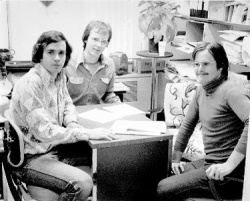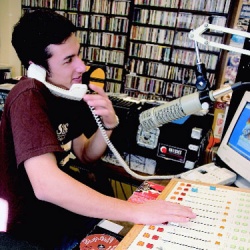Personal tools
Help
Class Notes
- Do you have news for fellow WSU alumni and other readers of Washington State Magazine? Send us your class note.
Our Story
written by alumni, faculty and friends.
NOTE: THIS IS A LEGACY SITE AND IS NOT REGULARLY MAINTAINED
Views
Happy 25th, KZUU!
From Our Story
by Hannelore Sudermann, Washington State University, Summer 2005
It was a rock ’n’ roll idea in a Bee Gees world.
KZUU-FM was born of the idea that there was a world of good music out there, and no one was hearing it. “We were influenced by a lot of other radio stations at a lot of other universities,” says Jon Etherton (’78 Comm.), one of the founding members.
At the time, WSU already had a student music station called KUGR, which played to the college audience. But it was run out the school of communication under the professors’ watchful eyes. It played popular music. And it was transmitted via cable to just a few dorms. It also had more students vying for DJ spots than it could handle.
So when WSU Extension Information worker Robert Searfoss (’73 M.Ed.) told a broadcasting class that students could start a real station of their own, “about five or six students sat straight up,” he says. They came to him after his talk and asked for help.
“You have to remember, it was the late ’70s. People didn’t have PCs, they didn’t have laptops, they didn’t even have televisions in their rooms,” says Searfoss. “What they did have was stereo sets. They all had an FM receiver.”
“Music was very important,” he says. “It was a very big part of the students’ social life, sort of their intellectual lives out of class.”
The students wanted the station to be available throughout Pullman and to play to the eclectic tastes of the college audience, offering progressive rock and jazz. “Our motto was ‘Anything but Top 40,’” says Etherton.
What the students were proposing was an independent, student-run, 10-watt FM station based in the CUB and run with the help of ASWSU—a place where they could be involved with student activities even if they didn’t fit in with the Yell Squad, the Performing Arts Committee, or the Black Awareness Committee.
But that’s not what everyone else wanted. This small but tenacious group met opposition from students and faculty concerned that it would compete with KUGR, from local radio stations, and even from managers of a TV station in Spokane who were concerned the proposed station’s signal frequency would interfere with their broadcasts.
Still, the group found support from all over campus. The performing arts committee, the games area, and the residence hall association all wrote letters in support, some noting that students were dissatisfied with the current limited number of stations.
Finally, during the 1977-78 school year, the students won ASWSU approval. With donated equipment and help from the amateur radio student club, they set up a cable broadcast station and turned in an application to the Federal Communications Commission for air space. They were approved in 1979.
“It was pretty exciting going through the whole thing,” says Henry Huestis, (’79 Engr. ) “I took away real-life experience in terms of how to get something done and in terms of engineering a radio station.”
Today the DJs leave notes to one another on the covers of the CDs and albums with information like personal details about the artist or that the sixth song is a Bowie remake. The notes are a tradition that stems back to the station’s earliest days.
No Usher, no Avril Lavigne, no Destiny’s Child, no Maroon5, no Green Day.
The artists that come across KZUU’s airwaves today include Mates of State, Rufus Wainwright, and Brazzaville. They also sometimes include the Joni Mitchells and Chick Coreas of years gone by.
And if KZUU music does get commercial-radio play, the CD is pulled from the shelves. The students hold it in the business office and hope that it becomes unpopular again, says Guay.
The station manager is at a tough point now with a group called the Shins. During a scene in the movie Garden State, actress Natalie Portman says she’s listening to them. “I was floored,” says Guay. “I’m like, ‘No, people aren’t supposed to know about them.’”
The DJs may be playing mostly CDs instead of vinyl now, and the programming happens with the help of a computer, but little else has changed. “If you’re not school-spirity, it’s a place where you can feel like you belong,” says Heather Ebba Maib, who is DJ Hezza on air.
All the work is volunteer, and the 24-hour station runs on about $5,400 a year. “It pays for our office supplies,” says Guay. “Thankfully, all the music is free.” And thanks to the Internet, KZUU has more than a local audience. The station has listeners as far away as Australia. “No matter when you’re broadcasting, there’s always someone out there listening,” says Guay.
So happy 25th birthday KZUU, 90.7 FM. Maybe we’re a year late, but hey, rock ’n’ roll isn’t about being on time.
External links
Our Story site map
Our Story main page | Our Story categories | Help Desk
Contact | Give | Advertise
Washington State Magazine | Washington State University | Class Notes
Our Story is coordinated by
In partnership with
Our Story and Washington State Magazine are publications of Washington State University. All rights reserved.
P.O. Box 641227, Washington State University, Pullman, WA 99164-1227 USA | wsm@wsu.edu, 509-335-2388
Accessibility | Copyright | Policies


